kind regards
Mel, Angela, Pete and Kate.
Latest research and knowledge exchange news at Bournemouth University
kind regards
Mel, Angela, Pete and Kate.
 Explore how working with the media can help to raise the profile of your work and research and lead to impact.
Explore how working with the media can help to raise the profile of your work and research and lead to impact.
Take away practical tips on talking to journalists, tracking the impact of media coverage and finding the best ways to reach your target audiences.
This session is open to all academic staff who are interested in engaging with the media, no experience is necessary.
By the end of the session, attendees will:
• Understand the media landscape and how to engage with journalists effectively
• Know how to find their target audiences and how to best to reach them
• Have learnt how to maximise and track the impact of media coverage
Book your place here under ‘Impact Essentials: Engaging with the Media for Impact -18/01/2024’ in the drop-down menu.
Facilitated by:Emma Matthews – Research Communications Adviser, ematthews@bournemouth.ac.uk
This is a great opportunity to become involved in Parliament, get your research noticed and have policy impact. Parliament’s Knowledge Exchange Unit has opened applications for Parliamentary Research Leads in the following areas:
This is a prestigious and influential role, the purpose of which is to facilitate and enhance the use of research evidence and expertise in Parliament (in both the House of Commons and House of Lords) through effective knowledge exchange and collaboration. Each TRL leads on a specific policy area.
To achieve this, TRLs conduct three primary activities:
Applications are open to:
The position of TRL is a highly influential and prestigious role at the heart of Parliament. As far as we are aware, we are the first parliament globally to have developed such a position, and the first nation to have embedded an academic network in our legislature. In a global landscape, delivering and developing this role therefore provides exciting possibilities.
The role offers an exciting opportunity for you to see first-hand how research feeds into policy, through shaping parliamentary work with your research expertise and participating in the development of parliamentary processes for knowledge exchange.
You will be uniquely placed to build connections with parliamentary and government stakeholders, and this participation will provide you with rich and varied experiences to support you on an upward professional trajectory. Current postholders have reported that the role has contributed to advancement in their careers, including to professorial level.
Please email impact@bournemouth.ac.uk in the first instance if you are interested in applying for one of these roles.
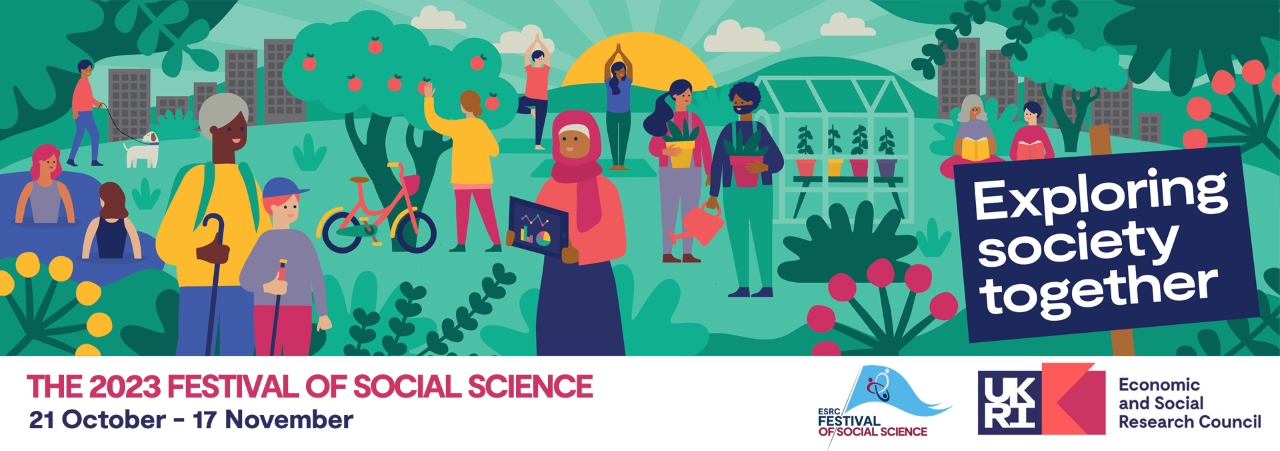
This autumn BU put on a diverse range of events as part of the annual ESRC Festival of Social Science, which saw 387 events held nationwide. The Festival, which celebrates the research of social scientists, focused on a theme of ‘lifelong wellbeing’ in 2023.
BU contributed to the Festival for the 12th year in a row, attracting more than 340 attendees to eight very different events, ranging from an evening celebration of ska music in Dorset, complete with band, to an online webinar aimed at debunking the misconceptions that exist about Long-COVID. For the first time, BU partnered with the University of Southampton, running two joint events.
The Festival is designed to promote and increase awareness of social science and ESRC-funded research, enable social scientists to engage with non-academics and increase awareness of the contributions the social sciences make to the wellbeing and economy of UK society.
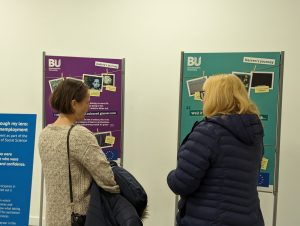 Our festival programme kicked off with ‘Life through my lens: Tackling weight and unemployment’, a drop-in, interactive exhibition in Poole’s Dolphin Centre.
Our festival programme kicked off with ‘Life through my lens: Tackling weight and unemployment’, a drop-in, interactive exhibition in Poole’s Dolphin Centre.
Dr Sophia Amenyah and Professor Lee-Ann Fenge led the day-long event, which showcased photos and stories from participants in the ASPIRE project.
This project explores how to reduce unemployment and obesity at the same time by supporting people to make healthier lifestyle choices.
 Curious shoppers were able to pop in and view the exhibition and could choose their own images to illustrate what health and wellbeing meant to them and add comments to a collage.
Curious shoppers were able to pop in and view the exhibition and could choose their own images to illustrate what health and wellbeing meant to them and add comments to a collage.
Many passers-by spent time chatting to the researchers and volunteers from Healthwatch, the independent champion for people who use health and social care services 
“It was really interesting to reflect upon modern and traditional approaches to healthcare” Feedback from attendee
 BU researchers and cyber security undergraduates teamed up with cyber technology organisation CyNam to deliver ‘CyGamBIT – using play to stay safe online’ for pupils from Years 12 and 13.
BU researchers and cyber security undergraduates teamed up with cyber technology organisation CyNam to deliver ‘CyGamBIT – using play to stay safe online’ for pupils from Years 12 and 13.
BU Professor of Forensic Security Vasilis Katos welcomed students from four different schools, who got to play CyGamBIT, a game designed to engage young people with current and emerging online threats to enable them to stay safe online. 
Members of BU’s CyGamBit team, including Dr Jane Henriksen-Bulmer, Emily Rosenorn-Lanng and Stevie Corbin-Clarke were on hand to answer questions about the game and students also heard from BU undergraduates about the cyber security courses on offer at the university.

“I knew the pupils would get far more out of this than me just talking to them about it” Feedback from Mark Mortell, Head of Computer Science, Parkstone Grammar School
“Great event, top work!” Feedback from school attendee
The next event in our series, ‘UK drowning: Turning the Tide’, took place at the RNLI College on Poole quayside, which looked at how to stay safe when swimming in open water.
Dr Sam Hills, whose research looks at the risk factors associated with drowning, led an interactive session with colleagues from BU and Dr Martin Barford from Leeds Trinity University for a packed room of wild-swimming enthusiasts and others interested in drowning prevention. Dr Jill Nash from BU discussed her ongoing research project exploring the influence of emotions on RNLI communications and their link to behaviour change.
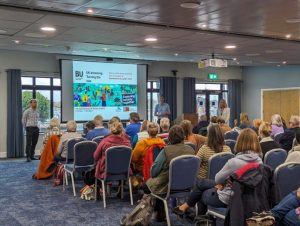
Attendees had a go at line-throwing, with the help of RNLI volunteers, tested their physiological response to cold water (one arm only immersed!) and tried out an immersive virtual reality experience.
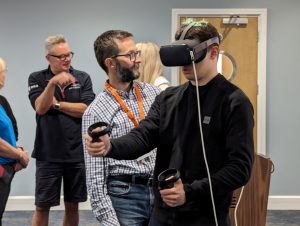

“Love how interactive it was. Very informative and I’m interested in following this research in future” Feedback from attendee
Our following event was a real departure from previous years – ‘Two-tone towns: A social History of Ska in Dorset’ combined talks from Dr Ian Gwinn and Dr Tabitha Baker with video interviews and a roof-raising set from local ska band The Guns of Navarone! 

Taking place at our Café Scientifique venue, the Black Cherry Café in Boscombe, attendees learned about the social significance of ska music in rural areas such as Dorset and got to dance to some classic tunes from The Specials and Madness. 
Louise Boston-Mammah from research partner DEED, a local organisation which aims to support teachers and students’ understanding of global issues and cultural diversity, commented: “What moved me the most about this event was the passion of those who were part of the local Ska scene and how they found a voice through this event”.
“This was a really interesting and enjoyable event. A great combination of learning about local history and musical performance by a great band” Feedback from attendee
Two of our events this year were jointly run with researchers from the University of Southampton: ‘Sharing the Coast’ and ‘Sharing the Forest’. Both explored the idea of the ‘right to roam’, whether Bournemouth’s coastline or the New Forest’s woods and heathland.
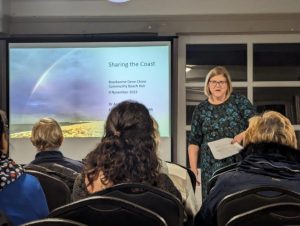 At the clifftop Branksome Dene Room, BU’s Dr Andrea Jarman introduced the coast event with a look at the complex legal situation regarding access to beaches, using Swanage as an example.
At the clifftop Branksome Dene Room, BU’s Dr Andrea Jarman introduced the coast event with a look at the complex legal situation regarding access to beaches, using Swanage as an example.
Local campaigner Steve Elsworth spoke passionately about successfully fighting to restore access to Castle Cove Beach in Weymouth and Professor Rick Stafford provided a perspective on the non-human species that share the coastline. 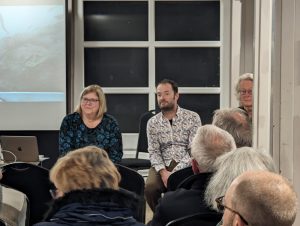
“Fantastic event. Very welcoming and informative” Feedback from attendee
“Three really great and diverse discussions and presentations” Feedback from attendee
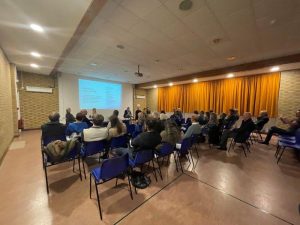 The second event took place at Lyndhurst Community Centre, in the heart of the New Forest. University of Southampton’s Dr Sarah Nield gave an overview of the laws, rights and obligations governing the Forest.
The second event took place at Lyndhurst Community Centre, in the heart of the New Forest. University of Southampton’s Dr Sarah Nield gave an overview of the laws, rights and obligations governing the Forest.
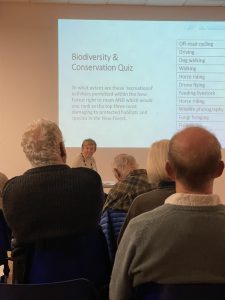 She was joined by representatives from Forestry England, the New Forest National Park Authority and the Campaign for National Parks among others, who all contributed to a lively and engaging discussion.
She was joined by representatives from Forestry England, the New Forest National Park Authority and the Campaign for National Parks among others, who all contributed to a lively and engaging discussion.
Attendees also took part in three interactive quizzes that tested their knowledge on the area’s biodiversity, recreational use and the laws surrounding communing.
“It was really helpful to hear diverse views” Feedback from attendee
“Learnt lots about the forest as someone who uses it often” Feedback from attendee
A team of researchers led by Professor Debbie Holley delivered ‘The magic of play: enhancing wellbeing during medical interventions’ at Bournemouth Gateway Building, an event aimed at healthcare professionals.
The workshop explored how magic and play therapy can support wellbeing during hospitalisation and medical appointments. 
Participants took part in interactive activities, using knitted toy characters, LEGO® SERIOUS PLAY® and virtual reality, to discover how they can help promote distraction from pain and anxiety.

“It was interesting to learn about how to use play to build a rapport with children” Feedback from attendee
The final event in our Festival series, ‘Long-COVID: Myths, misconceptions and lives experiences’, took place online, to ensure those most likely to be interested could safely and easily attend.
More than 120 people joined the live session, led by BU researchers Dr Emma Portch and Dr Rachel Moseley, with University of Brighton colleague Dr Liam Wignall. They were joined in discussion by Dr Charles Shepherd of The ME Association and Claire Higham of Long Covid Advocacy.
Long-COVID is estimated to affect 1.9 million people in the UK, but research has found low public awareness of the condition, with many feeling that medical professionals do not take it seriously.
As well as exploring the truth behind some of the myths around Long-COVID, Emma and Rachel shared the latest research findings and participants heard about the experiences of those living with the condition.
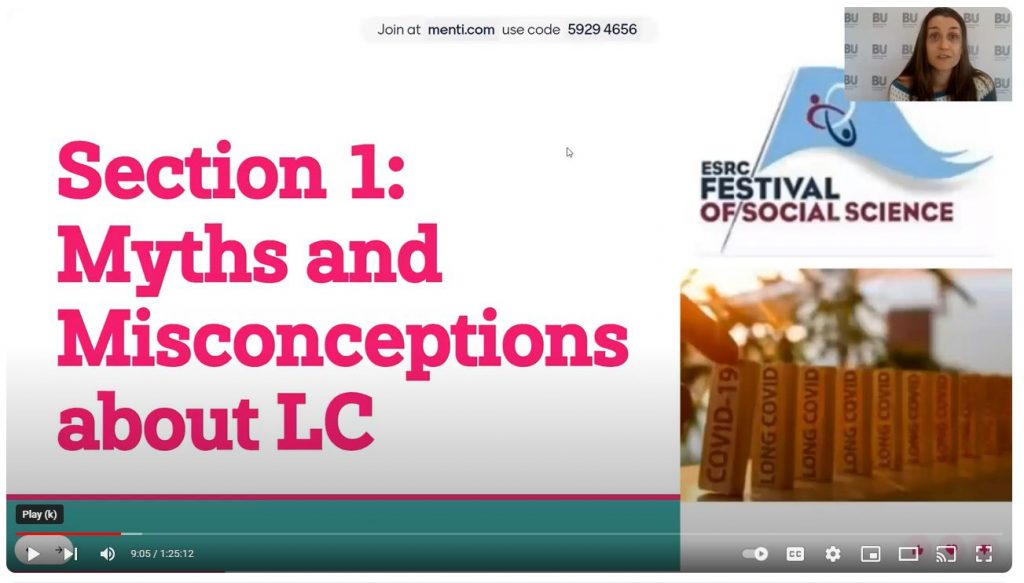
“Absolutely excellent presentation on a really important topic” Feedback from attendee
“Thank you for acknowledging and doing research on Long Covid. In Canada, we struggle to be heard” Feedback from attendee
The ESRC changed the rules in 2023 around which institutions could take part in the Festival, which meant BU could no longer be a standalone contributor. It is thanks to our collaboration with the University of Southampton that we were able to take part this year and deliver such a broad range of events.
Event organisers applied via a competitive internal process in July, and were selected by a panel comprising researchers and Professional Services staff. They were supported in bringing their engaging, creative projects to life by Adam Morris (formerly Engagement Officer, now Impact Advisor) and Beverley Allen (Events and Communications Coordinator).
If you would like to take part in a future ESRC Festival of Social Science, it is a great time to start thinking about what you could propose. Start by taking a look at the call for the 2023 festival to get an idea of what we’re looking for in applications for 2024.
The open call for next year’s festival will go out May/June 2024.
If you would like to start discussing your ideas, please get in touch with the public engagement with research team at publicengagement@bournemouth.ac.uk.

We’re excited to share …
some great RKEDF training opportunities coming up in December
Please, click on the post titles to see details and book your place on to upcoming events.
By the end of the session, attendees will have an understanding of BRIAN and how it relates to Staff Profile Pages, how to create and update items and activities, how to claim/create/import publications, as well as how to upload full text articles to BURO (Bournemouth University Research Online).
Meet your RSA reps, hear updates on how BU is implementing the Research Concordat and give feedback or raise concerns that will help to develop and support the research community at BU
This session will provide an overview of the REF, it’s purpose and how it is carried out, as well as looking ahead to the next REF2028 assessment.
This is an opportunity to have a guided tour of the Konfer platform and its full functionality, enabling you to create and connect to the UK research collaborations with other universities and businesses.
By the end of this session, you will be familiar with the structure of an impact case study, what makes an excellent case study and what you will need in order to start building an impact case study from your own research.
By the end of this session, attendees will have a strong foundation of what to expect when being responsible for their awarded projects.
This session is aimed at all academics to provide an overview of the Research & Enterprise Database, including how to access the system, the information available to view, budget management via RED.
Please make sure you inform us in advance if you cannot attend an event that you have already booked onto, at RKEDF@bournemouth.ac.uk
Sign up for this practical training session led by Sarah Carter-Bell, Knowledge Exchange Manager at UK Parliament, which also provides the opportunity to network with colleagues from AECC University College and Arts University Bournemouth.

This is particularly suitable for those with little or no experience of engaging with Parliament. As well as providing insights and information on how to get your research in front of the right policymakers, the session will provide time for you to identify key committees or APPGs relevant to your research, start a list of key contacts and write an introduction to a Parliamentary team.
If you have any specific questions you would like addressed during the workshop, please email them to impact@bournemouth.ac.uk by 5pm, Thursday 4th January.
Lunch is provided. Please indicate if you have any dietary requirements.
 This workshop is aimed at researchers who would like to learn what an excellent REF impact case study looks like and how to start building your own case study from scratch.
This workshop is aimed at researchers who would like to learn what an excellent REF impact case study looks like and how to start building your own case study from scratch.
– We will look at the different sections of a case study and what is required for each one, then examine impact case studies from previous REFs to establish what the panels are looking for. We will then move on to thinking about what you would need to do to start building your own impact case study.
– By the end of this session you will be familiar with the structure of an impact case study, what makes an excellent case study and what you will need in order to start building an impact case study from your own research.
Book your place here – under ‘impact essentials:Anatomy of an Impact Case Study’ in the drop-down menu
For any queries regarding this workshop, please contact RKE Dev Framework
At Café Scientifique, you can explore the latest ideas in science and technology in a relaxed setting. Enjoy listening to a short talk before engaging in debate and discussion with our guest speaker and audience
 We’ll be joined by Dr Matteo Toscani on Tuesday 5 December from 6:30 – 8:00pm.
We’ll be joined by Dr Matteo Toscani on Tuesday 5 December from 6:30 – 8:00pm.
Digital devices use technology based on scientific understanding of how we perceive colour to ensure images look as natural as possible. But the Dutch ‘Old Masters’ were doing something similar to enhance the realism of their paintings in the 17th-century.
Join psychologist Dr Matteo Toscani, from Bournemouth University, who will use examples of these masterpieces to demonstrate how artists used their knowledge of colour perception to create vividly realistic works of art.
This event will be held at The Black Cherry in Boscombe, Bournemouth. Although the talks start at 6:30pm, the café will be open early so we encourage you to arrive early for a drink and a bite to eat before the talk starts.
If you have any questions about this event, or if you’re interested in getting involved with a future Café Sci event, please email the Public Engagement with Research Team: publicengagement@bournemouth.ac.uk
Would you like to share your research with a public audience? Get involved with our Café Scientifique series
Café Scientifique is a public event that takes place at The Black Cherry in Boscombe on the first Tuesday evening of the month (excluding January & August), and is organised centrally by the BU Public Engagement with Research Team, part of Research Development and Support.
The format involves delivering a short talk, followed by the opportunity for discussion and questions from a varied public audience. It is a fantastic opportunity for you to gain experience in engaging with the public in a friendly relaxed atmosphere.
We welcome academics at all career stages, although this opportunity is particularly valuable for those getting started in engaging with the public. We encourage collaboration between less experienced and more experienced public speakers to help provide support and gain a rewarding learning experience.
The team will support you every step of the way. From developing your ideas to engage with a public audience, to setting up and promoting your event. We will also be on hand on the day to help your event run smoothly.

Please note: Completing this form does not guarantee you a space. We will be in touch with you to discuss your interest.
If you have any questions about getting involved with Café Sci, please get in touch with the Public Engagement with Research Team: publicengagement@bournemouth.ac.uk.
Applications are open for Award Lecture applications for the 2024 British Science Festival, hosted by the University of East London.

Call for Award Lecture applications
Are you, or do you know, an exceptional early career researcher?
Every year the British Science Association opens applications for the seven Award Lectureships available to early career academics who are skilled at engaging people with their research. These Award Lectures aim to promote open and informed discussion of science and related disciplines.
Awards are available in seven different areas:
As well as presenting your lecture at the British Science Festival, Award winners will also receive public speaking coaching and a £250 honorarium. There may also be other opportunities to present the Award Lecture at other science festivals in the UK.
More information, including the application process can be found here
The deadline for applications is 23.59 on Sunday 10 December 2023.
If you have any questions please contact Louise at louise.cooke@britishscienceassociation.org

This session will be led by Sarah Carter-Bell, Knowledge Exchange Manager at UK Parliament and is an introduction for researchers who have limited or no experience of engaging with Parliament.
As well as providing insights and practical information on how to get your research in front of the right policymakers, the session will provide time for participants to identify key committees or APPGs relevant to their research, start a list of key contacts and write an introduction to a Parliamentary team.
This training event is open to academics at AUB and AECCUC, as well as BU, and there will also be an opportunity to network over lunch with researchers from these institutions to discuss potential collaborations.
If you have any specific questions you would like to be addressed during the workshop, please email them to impact@bournemouth.ac.uk by no later than 5pm Thursday 4th January.
At BU we promote and celebrate the work done to engage public audiences with our research. The Public Engagement with Research team in Research Development and Support can help promote your event to relevant audiences through our monthly newsletters and via our social media channels.

To be considered for inclusion, your event or activity must be;
Event descriptions may be edited for consistency in style with other content.
Share your upcoming public event or activity

If you have any questions, please contact the team publicengagement@bournemouth.ac.uk

Over the past fifteen years, we have cultivated and nurtured a robust and enduring research partnership with The Tank Museum. This extensive collaboration has borne fruit through a series of successful projects, undertaken in conjunction with both The Tank Museum and the Ministry of Defence UK. One of the standout outcomes of our cooperative efforts with The Tank Museum was the pivotal role it played in the creation of the REF2021 BU UoA12 Impact Case Study. Throughout this period, our collaborative research has not only thrived but has also made substantial contributions to fostering a mutually beneficial relationship between BU and industry, primarily in the realm of Design Engineering education.

The end of a significant chapter in our long-standing collaboration was marked by a farewell luncheon in honour of The Tank Museum’s Director, Richard Smith OBE. Richard Smith will be embarking on a new venture within another esteemed organisation. While this may signify the conclusion of an era, it is unequivocal that our commitment to fostering and fortifying our alliance with both The Tank Museum and Richard’s new organisation will remain unwavering.
With deep respect and gratitude, Professor Khan and his distinguished team, comprising Dr. Adil Saeed, Dr. Hammad Nazir, Professor Keith Stokes, and Dr. Jawad Latif, extend their heartfelt best wishes to Richard Smith OBE. Simultaneously, they extend a warm and anticipatory welcome to the incoming Director of The Tank Museum, as we collectively embark on new horizons of research and education in the days to come.

Professor Khan has been recently awarded prestigious research exchange funding by Tsinghua University in Beijing, China. Tsinghua University ranks 1st in Asia and 12th World Ranking and 9th World Reputation. The collaboration between Professor Khan and Professor Yonggang Meng of Tsinghua University has been in place since 2009-2010 and has resulted in multiple exchange visits and academic achievements. Building on his ongoing collaborative research with Tsinghua University, which is supported by the National Natural Science Foundation of PR China and Global Visiting Fellowship Award from Bournemouth University, has led another output which has been accepted for publication in Tribology Letters, a solid quartile one journal in mechanical engineering. This recent collaborative work offers valuable insights into the mechanisms of achieving super low friction in liquid-lubricated sliding point contacts. Its potential applications in various industries and contributions to academic understanding make it a significant endeavour with far-reaching impacts.
The central question being explored by Professors Khan and Meng, along with their research teams, is the key to achieving super low friction in water-based ultralow or super low friction experiments. This question carries significant importance for both academia and industry.
In academia, understanding the factors that influence super low friction can advance our knowledge of friction reduction mechanisms. This research contributes to the academic understanding of this critical field and can serve as a foundation for further investigations.
In the industrial context, the impacts are substantial. Achieving super low friction has the potential to improve the efficiency of mechanical components and reduce energy consumption in various industries. This knowledge will lead to the development of more efficient machinery and systems, saving resources and costs for industries.
Here’s your catch-up edition after the Parliamentary recess for the party conferences.
We’ve the full detail from the Conservative events and some snippets from the Labour Conference (we’re still awaiting some of the event transcripts and reports). In addition we have a guest slot from Nat and Stephen who attended the conferences.
Big news is the announcement that A levels and T levels are to be ditched for the Advanced British Standard qualification…in 10 years’ time, perhaps. And Minister Keegan is moving forward to establish minimum service levels for the HE sector during strike action.
You can read short summaries (provided by Dods) from a wide range of the fringe events held at the Conservative conference here. Pages 2-3 contain the list of fringe events for you to peruse.
Here are some teasers and snippets on the interesting ones:
Skills Britannia: Developing workforce capabilities to drive social mobility with Minister Halfon. The panellists spoke about the need for focus on vocational systems as much as the focus on universities, and the need for greater guidance to students on how they could access them.
Delivering the skills Britain needs – the role of modern universities with Gillian Keegan, Education Secretary. The session focused on skills and apprenticeships, with particular emphasis on the role which universities could play in closing the skills gap.
Snippets:
How can science and innovation support an ambitious plan for economic growth? With George Freeman, Minister for Science. The panel discussed priorities for the Government in science and innovation, and what the main challenges facing the sector were.
Snippets:
Key speeches:
Fit for the future: How UK life sciences can drive growth and improve the health of the nation with Chi Onwurah, Shadow minister for Science, Research and Innovation. The panel focused on the vital role played by life sciences to the UK economy and the importance of every region of the UK supporting this sector.
Peter Kyle, Shadow Secretary of State for Science Innovation and Technology speech announced 10-year R&D budgets. Snippets:
Making Britain Work – Modern Universities and the Public Sector Workforce with Andrew Gwynne, Shadow Minister for Social Care. The panellists discussed the workforce crisis in the public sector and the important role universities played in training the next generation of public sector workers. The conversation predominately focused on the recruitment, training and retention of teachers and nurses, with panellists discussing why these vital sectors had become less attractive career paths.
George Freeman, science research and innovation minister, wrote for Research Professional in Sold on science. The article is a quick whizz through all the major R&D developments introduced by the Conservative party from the ringfencing of R&D spend to the development of ARIA. It’s an easy read and show the policy progression of the last 13 years, or as Freeman names it the Conservatives legacy.
At the Conservative Party Conference Michelle Donelan (DSIT Secretary of State) announced:
The Regional Innovation Fund will:
DSIT published a policy paper UK strategy for engagement with CERN: unlocking the full potential of UK membership of CERN which aims to ensure the UK gains a good return on its membership of CERN. The UK is one of 12 members of CERN which aims to uncover the mysteries of the universe, including what it is made of and how it works. Space is an important investment area for the Government and they’re keen to maximise the UK’s research potential and leverage funding. CERN is better known for being the creators of the World Wide Web. Minister for Science George Freeman stated: As the second largest contributor to CERN, our return on investment is below where we would like it to be, with much more we can still do to ensure we take full advantage of all opportunities that are afforded by CERN membership. The strategy covers five areas:
More detail here.
Rishi’s speech to the Conservative Party Conference said he was committed to stopping universities from enrolling students on courses that do nothing for their life chances, and that the target for 50% to attend HE as a false dream.
UUK Chief Executive, Vivienne Stern, responded to Rishi’s speech commenting: This political rhetoric is not in the interests of students, or the economic prospects of the country as a whole. We should be expanding opportunities and not talking down what is a national success story.
The biggest education announcement of the conference was Rishi’s intention to introduce the Advanced British Standard (ABS), a new Baccalaureate-style qualification for 16- to 19-year-olds which would bring A levels and T levels into a single qualification. The outline of the qualification would include 195 hours more teaching than current provision and learners would study five subjects. Responses to the announcement haven’t balked at a potential change to the long established A level system. Instead the ABS plans have been heavily criticised as there are already concerns for teacher recruitment/retention, particularly in FE, and sector commentators note increasing the number of teachers (even through incentives) is unlikely to yield the level of staff needed to deliver the qualification. If successful the change to ABS would be phased in over the next 10 years. The Guardian has coverage on the teaching crisis angle, highlighting an additional 5,300 teachers would be needed (not to mention a significant uptick in the education budget to fund them). There are more responses to the announcement from the HE sector here.
Education Secretary Gillian Keegan also spoke about the ABS in a subsequent speech.
Shortly after the speech the DfE published a 47 page paper: A world-class education system – The Advanced British Standard, meaning these plans have been in the offing for a while (and Maths to 18 was a key pledge in Rishi’s bid for PM). There’s a shorter Government press release here.
We have a summary if you’d like more detail on the ABS, summary content is drawn from the DfE paper.
The next steps in the ABS journey are:
Nathaniel Hobby and Stephen Bates feature in our latest guest update on the conferences. Nat and Steve attended the Liberal Democrat, Conservative and Labour Party conferences to understand future opportunities for BU, and to meet with fellow public affairs professionals to talk about collaboration in the coming year and here is their update.
Student withdrawals
The SLC published the (early) in-year student withdrawal statistics. The figures compared the number of students withdrawing from university over five academic years from 2018-19 to 2022-23.
Advance HE published the Student Needs Framework. It maps and categorises students’ needs as:
It’s a broad overview and doesn’t delve into interventions and explore the multiple ways students may manifest their individual needs. Advance HE say: The framework is designed flexibly to support a broad range of colleagues, especially those involved in teaching, learning and student support in strategic or in practice roles. It will be most effective if adopted at an institutional level, mapped with consideration to your institutional context and priorities to enhance practice and policy.
More information here.
The OfS published the independent evaluation of the Uni Connect programme’s impact on outcomes for learners. The report is based on learner survey findings after Wave 4 of the project and it recommends that Uni Connect partnerships and individual HEIs should:
At the Conservative Conference Gillian Keegan, SoS Education, announced a consultation to introduce minimum service levels in universities during strike action to ensure students receive the teaching they deserve. The DfE have announced more details: The consultation will focus on stronger protections for final year students, key cohorts or those studying specialist subjects. If introduced, the minimum service level could ensure students get the education they pay for, protecting them from strike action, for example looking at how to guarantee continued services such as teaching contact hours and marking their work during walkouts.
The minimum service concept isn’t new – the Act requiring minimum service levels was passed in July 2023 and applies to education services alongside health, fire and rescue, transport, nuclear activities and border security. However, to implement this legislation regulations are required for each service. And a consultation was launched in August on some aspects of the implementation including what reasonable steps means.
In the DfE press release the government link the minimum service expectation with their priorities of ensure quality degree delivery (and value for money) and the OfS recruitment limits where courses have high student drop out. They state: Today’s announcement is another step in a series of long-term decisions to ensure a bright future for all children and young people, whether it be starting school, through to going to university or undertaking an apprenticeship.
We’ll be watching closely to see how they define minimum service for education, and specifically HEIs. Watch this space.
Here’s a reminder on the HE (Freedom of Speech) Act, which involves:
UUK published a briefing and case studies aiming help universities to prepare for the HE (Freedom of Speech) Act. It sets out summarises the new legislation, highlights the consultation for the new OfS conditions of registration has not yet been published, explains the statutory tort, complaints and overseas funding. Helpfully it contains some information on the other legislations and legal duties which overlap or contain free speech content.
With the likelihood of a 2024 election looming attention turns once again to HE tuition fees. Public First published an interesting report Public Attitudes to Tuition Fees: What are Labour’s Options for Reform? The key findings are below but in short it’s a wicked problem – people want fees to be free or lower but don’t want to pay for them from the public purse, the level of debt students leave HE with remains an emotive issue.
HEPI ran fringe events at both Conservative and Labour party conferences asking what should be in the party’s manifesto for HE and research. The recording of the Conservative event is here, the Labour event content isn’t available (yet). Ahead of the fringe events HEPI published a Higher Education Policy Institute report on three vice-chancellors’ hopes ahead of the party conferences. It set out the perspective of three HEI leaders on what they wanted to see in the manifestos for HE at the next election.
The essays all emphasise the centrality of HE to the UK’s future success and cover a broad range of themes, including research, local partnerships, and a long term skills strategy. There are some areas of consensus among the three authors (tackling the cost-of-living crisis among students and the growing shortage of student accommodation). However, they differ in their prioritisation of the request for more public funding. The essays are worth a read, even if a bit predictable.
Chris Husbands (Sheffield)
Sasha Roseneil (Sussex)
Adam Tickell, Birmingham
But before we get to an election, Policy Exchange have published a manifesto for the next session of Parliament – Iain Mansfield’s request for the King’s Speech. It includes a proposal for a Higher Education and Skills Bill (for England only), most of which will not be surprising to those who follow Iain on X or other platforms:
There are other proposals in the paper including on housing, leaseholder enfranchisement, anti-social behaviour etc. Not sure that any of this will turn into reality, certainly not in the King’s Speech this autumn, but these things may pop up in election material.
The Sutton Trust has published the report 25 years of university access setting out how access to HE has changed over time. See page 4 for the key findings.
Click here to view the updated inquiries and consultation tracker. Email us on policy@bournemouth.ac.uk if you’d like to contribute to any of the current consultations.
Medical schools: The government has asked the OfS to allocate an additional 205 places for medicine study as part of the drive to increase the number of doctors needed in the UK. Contact us for more information on this.
Cyber defence: UUK published guidance outlining the main cyber security threats to the HE sector and the impact of recent attacks against individual organisations. Actions universities are recommended to take include:
To subscribe to the weekly policy update simply email policy@bournemouth.ac.uk. A BU email address is required to subscribe.
External readers: Thank you to our external readers who enjoy our policy updates. Not all our content is accessible to external readers, but you can continue to read our updates which omit the restricted content on the policy pages of the BU Research Blog – here’s the link.
Did you know? You can catch up on previous versions of the policy update on BU’s intranet pages here. Some links require access to a BU account- BU staff not able to click through to an external link should contact eresourceshelp@bournemouth.ac.uk for further assistance.
JANE FORSTER | SARAH CARTER
VC’s Policy Advisor Policy & Public Affairs Officer
Follow: @PolicyBU on Twitter | policy@bournemouth.ac.uk
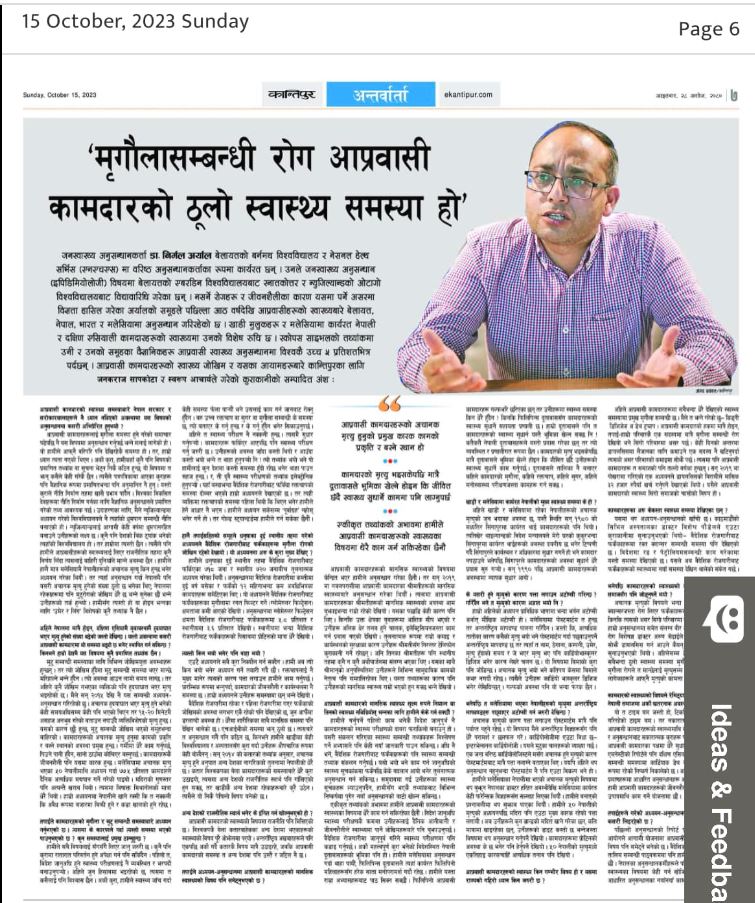 Dr. Nirmal Aryal, who is a part-time researcher in the Department of Nursing Sciences, was interviewed in Nepal by a journalist for Kantipur, the largest Nepali-language newspaper of the country. Nirmal was interviewed after our successful research dissemination events last week in both the capital Kathmandu and in Janakpur (in the south of Nepal). These dissemination programmes reported on a study into the risk of kidney damage in Nepalese migrant workers. This study, led by Bournemouth University’s Dr. Pramod Regmi,was funded by The Colt Foundation in the UK. Dr. Nirmal Aryal is also research associate in the Equality, Diversity and Inclusion Research Unit of Greater Manchester Mental Health NHS Foundation Trust.
Dr. Nirmal Aryal, who is a part-time researcher in the Department of Nursing Sciences, was interviewed in Nepal by a journalist for Kantipur, the largest Nepali-language newspaper of the country. Nirmal was interviewed after our successful research dissemination events last week in both the capital Kathmandu and in Janakpur (in the south of Nepal). These dissemination programmes reported on a study into the risk of kidney damage in Nepalese migrant workers. This study, led by Bournemouth University’s Dr. Pramod Regmi,was funded by The Colt Foundation in the UK. Dr. Nirmal Aryal is also research associate in the Equality, Diversity and Inclusion Research Unit of Greater Manchester Mental Health NHS Foundation Trust.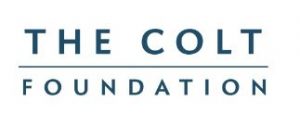
The interview with Nirmal Aryal in Nepali can be read online, click here!
Prof. Edwin van Teijlingen
Centre for Midwifery & Women’s Health (CMWH)
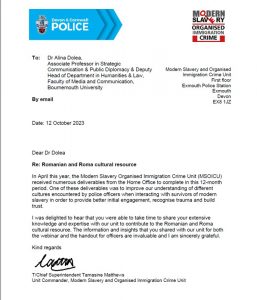 Dr. Alina Dolea, Associate Professor in Strategic Communication and Public Diplomacy and Deputy Head of Department in Humanities and Law, received a letter of thanks from the UK Modern Slavery and Organised Immigration Crime Unit (MSOICU).
Dr. Alina Dolea, Associate Professor in Strategic Communication and Public Diplomacy and Deputy Head of Department in Humanities and Law, received a letter of thanks from the UK Modern Slavery and Organised Immigration Crime Unit (MSOICU).
Dr. Dolea contributed with expertise and insights from her research on Romanian diaspora community in the UK to the Romanian and Roma Cultural Resource, a deliverable that MSOICU developed for the Home Office. In addition, on September 13, 2023 she delivered the webinar for the launch of the resource together with a Romanian NGO representative and a Romanian police officer in the UK, a format that was considered very successful.

There were over 80 police officers in the pilot webinar – the handout and the recording of the webinar have been since shared with all police force modern slavery leads and related stakeholders.
For the handout and the webinar, Dr. Dolea provided a historical background on the formation of the Romanian nation and the Romanian Roma community (including their discrimination and Holocaust during WW2), key aspects of Romanian and Roma cultures (language, religion, family life).
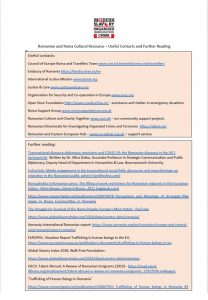
She explained the main reasons for emigration and the emotional costs of migration, the issue of lack of trust in authorities, but also trust in each other (fractured during Communism).
She also provided recommendations for communicating and engaging with Romanian and Roma victims or potential victims of modern slavery and organized immigration crime, as well as a list of further readings that were incorporated in the final documents.
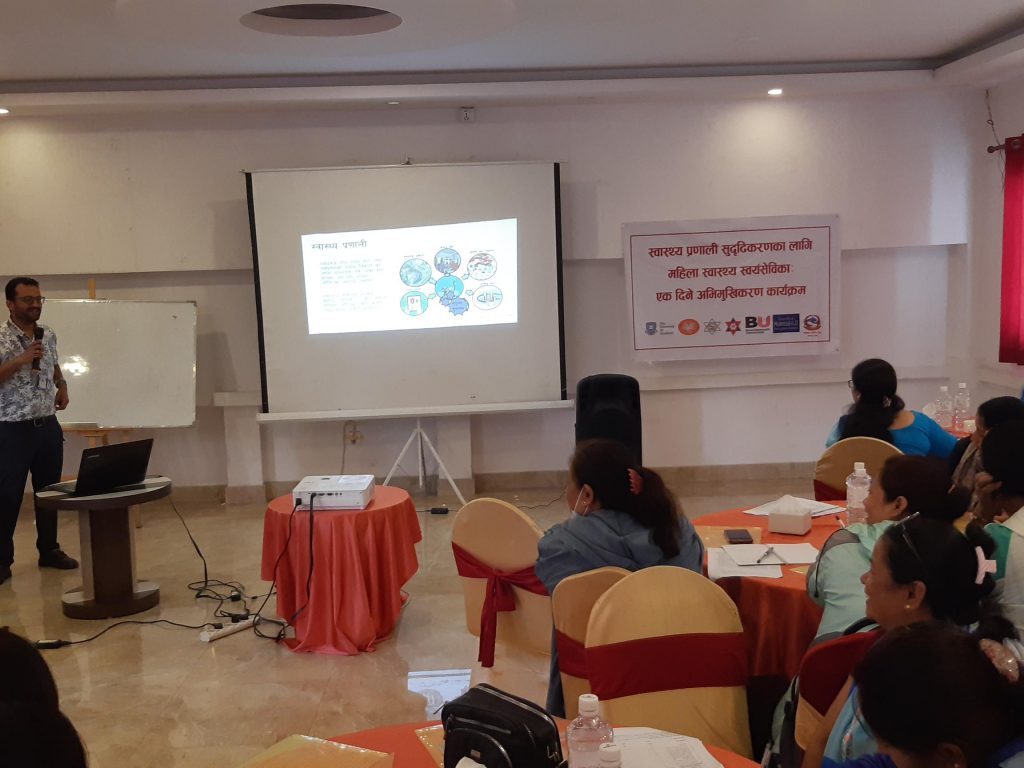 Today our collaborators Drs Sujata Sapkota and Sujan Gautam from Manmohan Memorial Institute of Health Sciences (MMIHS) organised and ran another training and orientation session for Female Community Health Volunteers (FCHVs) in a hotel in Kathmandu. The discussions in Nepali in today’s session are very lively with great participation from guest trainers as well as from the FCHVs. Many FCHVs are worried about their changing roles, and even the potential disappearance of the role.
Today our collaborators Drs Sujata Sapkota and Sujan Gautam from Manmohan Memorial Institute of Health Sciences (MMIHS) organised and ran another training and orientation session for Female Community Health Volunteers (FCHVs) in a hotel in Kathmandu. The discussions in Nepali in today’s session are very lively with great participation from guest trainers as well as from the FCHVs. Many FCHVs are worried about their changing roles, and even the potential disappearance of the role. 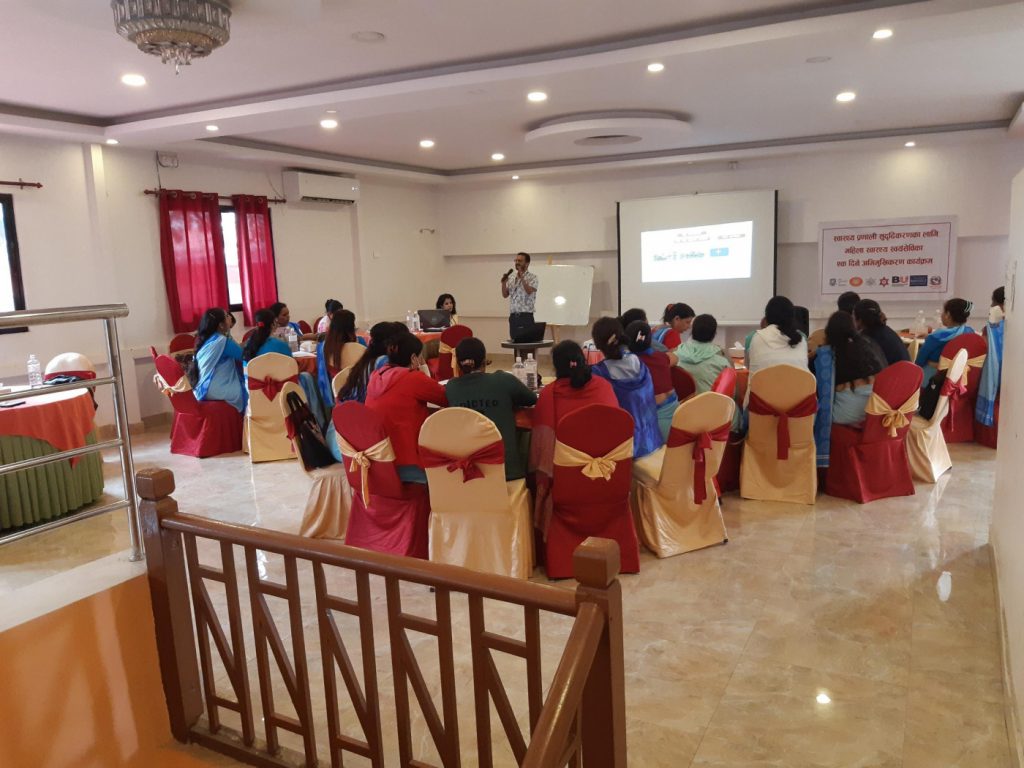
The sessions with FCHVs are crucial capacity building as part of our interdisciplinary study ‘The impact of federalisation on Nepal’s health system: a longitudinal analysis’. I had the pleasure of saying a few words about our international project which started in 2020 and will run to 2024. It is funded by the Health System Research Initiative, a UK collaboration between three funders: the MRC (Medical research Council), the Foreign, Commonwealth & Development Office, and the Welcome Trust. The research team includes researchers from MMIHS (Kathmandu), and PHASE Nepal (Bhaktapur), the University of Sheffield, Bournemouth University, and the University of Huddersfield (the three original UK co-applicants), and researchers now based at the University of Greenwich, the University of Essex and Canterbury Christ Church University.
Prof. Edwin van Teijlingen
Centre for Midwifery & Women’s Health (CMWH)